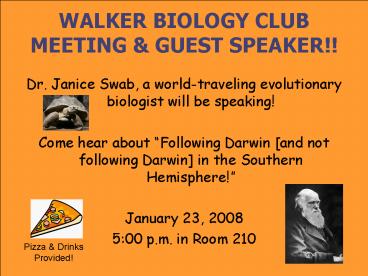Dr. Janice Swab, a world-traveling evolutionary biologist will be speaking! - PowerPoint PPT Presentation
1 / 32
Title:
Dr. Janice Swab, a world-traveling evolutionary biologist will be speaking!
Description:
WALKER BIOLOGY CLUB MEETING & GUEST SPEAKER!! Dr. Janice Swab, a world-traveling evolutionary biologist will be speaking! Come hear about Following Darwin [and not ... – PowerPoint PPT presentation
Number of Views:72
Avg rating:3.0/5.0
Title: Dr. Janice Swab, a world-traveling evolutionary biologist will be speaking!
1
WALKER BIOLOGY CLUB MEETING GUEST SPEAKER!!
- Dr. Janice Swab, a world-traveling evolutionary
biologist will be speaking! - Come hear about Following Darwin and not
following Darwin in the Southern Hemisphere! - January 23, 2008
- 500 p.m. in Room 210
Pizza Drinks Provided!
2
Campbell Pre-Med Allied Health
Were here to help
Welcome Back! Come join us for our first meeting
of the semester! Thursday, Jan 24 _at_ 500PM
Science Bldg. Room 210 Everyone is Welcome!
CampbellPreMed_at_gmail.com
3
Announcements
- Begin literature search!
- Locate a minimum of 1 review article 2 peer
reviewed research articles. - Type out a reference list have a copy of the
papers turned in by Feb 4! - Worth a 10 pt quiz grade.
- Exam 1 Mon, Jan 28
- Chapter 1
4
Antigen Presentation to T- cells
- continued
5
alpha
alpha
beta
B-2 microglobulin
- Antigen must be processed to be displayed on MHC.
6
The Endogenous Pathway
- MHC class I
- Endogenous Ag
- derived from pathogens that multiply
intracellularly.
7
Exogenous Pathway
- MHC class II
- Exogenous antigen
- derived from pathogens that multiply outside of
host cells or inside the phagolysosome.
8
How are T cells Activated?
9
T cells engage cells carrying the MHC with
antigen.
- TCR on CD4 T cells engages APC with MHC class II
molecules. - TCR on CD8 T cells engages cells with MHC class
I molecules.
Immunology (kuby)
10
For successful T cell engagement of the APC
- TCR must recognize bind to the MHC.
- CD4 or CD8 must participate.
- TCR must recognize bind to the antigenic
peptide.
11
- The TCR on the CD4 T cell engages the MHC class
II molecule on APC! (Fig. 1.27 p. 25).
12
- The TCR on CD8 T cells interact with the MHC
class I molecule Ag.
Toxic granules released
Virally infected CHO cells.
Fig. 1.26, p. 24
13
What does the interaction of T cells with the APC
accomplish?
- Clonal selection of the T cell leads to
- Proliferation
- Differentiation into effecter cells
- TH cells
- TC cells
- Differentiation into Memory cells
14
Why do T cells need to undergo positive
negative Selection to achieve tolerance?
15
The Humoral Immune Response
- Activation of B cells
16
1. T Independent Antigens
- Polysaccharides LPS.
- Crosslinks multiple Ig receptors.
Fig. 16-14, nester Microbiology
17
2. T dependent antigens
- Costimulation by the interaction with Th2 cells
is required!
A strong B cell Response generally requires
cytokine production from the Th2 cells.
Fig. 1.21, Janeway (6th ed)
18
Clonal selection clonal expansion
Generally require Th2 cell assistance
19
What are the activities of Antibody?
20
- Antibody Dependent Cell mediated Cytotoxicity
(ADCC) - NK cells (natural killer cells)-
- FcR (Fc receptors).
- Kills
- tumor cells
- Pathogens
- cells infected with pathogens.
21
Antibody Function
Fig. 1.29, 2nd ed
Immune Complex formation
22
- Ab can initiate complement activation by the
classical pathway.
- http//www.bmb.psu.edu/courses/bisci004a/immune/ac
tivate.jpg
23
Overview of the two arms of adaptive immunity
- Humoral Immunity Cell Mediated Immunity.
24
B cell internalizes Ag now is an APC
- Fig. 1.7, Immunology (kuby) 4th ed
25
- Fig. 1.13, p. 13, Immunology (kuby) 4th ed
26
Adaptive Immunity Demonstrates Primary
Secondary Responses
27
Adaptive Immunity- Primary Secondary Responses
p. 28, Parham
28
T cells demonstrate primary secondary responses
- Mouse A receives skin grafts
29
(No Transcript)
30
Improper immune responses may lead to allergies
or autoimmune disease.
31
- Coxsackie viruses
32
(No Transcript)































